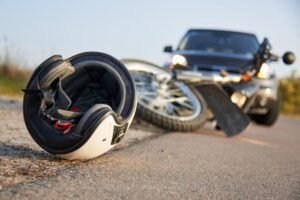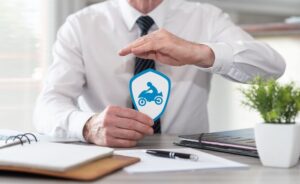What to do after a Motorcycle Crash
Motorcycle accidents that result from someone else’s negligence can lead to debilitating and sometimes fatal injuries for riders. This is especially true if the rider falls to the ground or strikes a vehicle during the accident.
If you suffered injuries in a recent motorcycle crash, it’s important that you talk with an experienced Tampa motorcycle accident lawyer in your jurisdiction right away. Your attorney can obtain a copy of the police report and other documentation, file a claim on your behalf, or litigate your case by filing a personal injury lawsuit in the state court system.
Steps to Take after Leaving the Hospital Following a Motorcycle Crash
After leaving the hospital following a motorcycle crash, it’s crucial to take several important steps to ensure your well-being and protect your legal rights.
- First, follow the medical advice that your doctors provide. Attend all follow-up appointments, take prescribed medications, and follow any rehabilitation or therapy recommendations. Your health should be your top priority as you recover from your injuries.
- Next, document everything related to the motorcycle accident. This includes collecting copies of medical records, police reports, and any other relevant documentation. Keep track of all medical expenses, including bills for treatment, medications, and therapy sessions. This documentation will be important for insurance claims and potential legal proceedings.
- Notify your insurance company about the accident as soon as possible. Provide them with all of the necessary information and cooperate fully with their investigation. Be cautious when discussing the accident with insurance representatives, and avoid admitting fault or making statements that can be used against you later.
- Consider seeking legal representation from a qualified motorcycle accident attorney. A skilled attorney can protect your rights, negotiate with insurance companies on your behalf, and pursue compensation for your injuries and damages. They can also advise you on the best course of action and help you navigate the complicated legal process.
- Take care of any property damage resulting from the accident. This may involve getting repair estimates for your motorcycle or other damaged property and filing a claim with your insurance company or the at-fault party’s insurance provider.
- Stay in touch with your healthcare providers and continue to monitor your injuries as you recover. Attend physical therapy or rehabilitation sessions as recommended and follow any restrictions or limitations that your doctors set. It’s essential to take your recovery seriously and not rush back into normal activities before you’re fully healed.
- Finally, consider seeking support from friends, family, or support groups. Dealing with the aftermath of a motorcycle accident can be emotionally challenging, and having a strong support network can help you cope with the physical and emotional toll of the experience.
By taking these steps, you can protect your well-being and pursue the compensation you deserve for your accident-related injuries and damages.
How do Motorcycle Crashes Happen?

Motorcycle accidents frequently result from the negligence of other drivers. One of the most common forms of negligence is a failure to yield the right-of-way to motorcyclists. In fact, car drivers often fail to see motorcycles altogether – especially at busy traffic intersections. When drivers turn left in front of an oncoming motorcycle, it can lead to a severe collision. This negligence is typically due to a driver’s lack of attention – or their mistaken belief that they have enough time to make the turn.
Distracted driving is another significant cause of motorcycle accidents. With the increasing use of smartphones, drivers are more distracted than ever. Texting, making phone calls, or using navigation systems takes their eyes off the road. Even a momentary lapse in attention can be deadly for motorcyclists, who rely on other drivers to be fully aware of their presence.
Tailgating is another dangerous behavior that leads to motorcycle accidents. Motorcycles can stop more quickly than cars, but if a car is following too closely, it may be unable to stop in time to avoid a collision. This can result in rear-end accidents, which are particularly hazardous for motorcyclists due to their lack of protection.
Negligence also includes drivers who fail to check their blind spots before changing lanes. Motorcycles can easily disappear into these blind spots, and when a driver suddenly shifts lanes without signaling or checking thoroughly, they may cause their vehicle to sideswipe the motorcycle, causing the rider to lose control or crash.
Drunk driving is another serious form of negligence that endangers motorcyclists. An intoxicated driver has impaired judgment and slower reaction times, making it more likely that they will not see a motorcycle or will misjudge the distance and speed of an approaching bike. This can lead to devastating accidents, as drunk drivers may swerve into the motorcyclist’s path or fail to stop in time to avoid a crash.
Poor road maintenance is another aspect of negligence, though it falls on government entities rather than individual drivers. Potholes, uneven pavement, and debris on the road can cause motorcyclists to crash. When these hazards are not promptly addressed, they represent a negligent disregard for the safety of all road users – particularly those on motorcycles.
If you suffered injuries in one of these types of motorcycle collisions, an experienced motorcycle accident attorney can review your legal options with you and aggressively represent you throughout your case.
Types of Injuries in Motorcycle Crashes

Motorcycle accidents resulting from others’ negligence often result in serious injuries for riders. One of the most common types of injuries is road rash. When a motorcyclist is thrown from their bike and slides across the pavement, the rough road surface can literally scrape off their skin. Road rash can range from mild to severe, sometimes requiring skin grafts and leaving permanent scars.
Broken bones are also frequent in motorcycle accidents. The force of a collision or a fall can easily break bones in the rider’s arms, legs, and ribs. Fractures in these areas can also be complex and may require surgery to fix. Wearing protective gear can help reduce the risk of broken bones, but it cannot eliminate it entirely.
Head injuries are among the most serious consequences of motorcycle accidents. Even when wearing a helmet, riders may suffer concussions or traumatic brain injuries (TBIs). A TBI can have long-term effects, including memory loss, difficulty concentrating, and changes in personality. Helmets are crucial in preventing the most severe head injuries, but they cannot prevent all of them.
Spinal cord injuries are another severe consequence of motorcycle crashes. Damage to the spinal cord can lead to partial or complete paralysis, depending on the location and extent of the injury. Paralysis can have a profound effect on the rider’s life, requiring long-term medical care and rehabilitation.
Internal injuries are also common in motorcycle accidents. The force of an impact can cause damage to internal organs, such as the liver, spleen, or lungs. These injuries may not be immediately apparent but can be life-threatening and require emergency surgery.
In addition to physical injuries, motorcycle accidents often lead to psychological trauma. Riders may experience post-traumatic stress disorder (PTSD), anxiety, and depression after an accident. The psychological effect can be long-lasting and may require therapy or counseling to overcome.
Legally Proving a Motorcycle Accident Case

Proving the legal elements of a motorcycle accident claim or lawsuit involves establishing key factors to demonstrate liability and seek compensation for injuries and damages. Here are the essential elements to consider:
- Duty of Care – The first element to establish is that the at-fault party (the defendant) owed the injured motorcycle rider (the plaintiff) a duty of care. In the context of a motorcycle accident, this typically means that the defendant had a legal duty to drive safely and follow all traffic laws to avoid causing harm to others on the road.
- Breach of Duty – The next step is to show that the defendant breached their duty of care by acting negligently or recklessly. This can include actions such as speeding, distracted driving, failing to yield, or driving under the influence of alcohol or drugs. Evidence such as witness statements, police reports, and accident reconstruction analyses can help demonstrate the defendant’s breach of duty.
- Causation – The plaintiff must also prove that the defendant’s breach of duty directly caused their injuries and damages. This requires establishing a clear link between the defendant’s actions and the harm that the plaintiff directly suffered. Medical records, expert testimony, and other evidence can be used to demonstrate the causal relationship between the accident and the plaintiff’s injuries.
- Damages – The final element of a motorcycle accident claim is to quantify the damages that the plaintiff suffered as a result of the accident. This includes economic damages such as medical expenses, lost income, and property damage, as well as non-economic damages such as pain and suffering, emotional distress, and loss of life enjoyment. Documentation such as medical bills, pay stubs, and testimony from medical experts and mental health professionals can help to establish the full extent of the plaintiff’s damages.
To prove these legal elements effectively, it’s crucial to gather thorough documentation and evidence, consult with experts when necessary, and enlist the assistance of a skilled motorcycle accident attorney. An experienced lawyer can aggressively advocate for the plaintiff’s rights and work to secure fair compensation for their motorcycle accident losses.
Available Damages in a Motorcycle Accident Case

In a motorcycle accident case, several types of compensation – also known as damages – may be available to the injured party to help cover their losses and expenses. These types of compensation can vary depending on the circumstances of the motorcycle collision and the extent of the injuries suffered. Here are the available types of compensation in a motorcycle accident case:
- Payment of Related Medical Expenses – This includes compensation for all medical costs incurred as a result of the motorcycle accident, such as emergency room treatment, hospital visits, procedures, doctor’s visits, prescription medications, rehabilitation, and therapy. It also covers anticipated medical expenses related to ongoing treatment or long-term care.
- Lost Income – If the injured party is out of work due to their injuries, they may be entitled to compensation for lost earnings. This includes loss of income during the treatment period and any future lost earnings due to the injuries, such as reduced earning capacity or the inability to return to the same job (at the same rate of pay) post-accident.
- Pain and Suffering – This type of compensation is intended to compensate the injured party for physical pain, emotional distress, and discomfort resulting from the accident and injuries. It covers both the immediate pain and suffering experienced after the accident and any long-term or chronic pain resulting from the injuries.
- Loss of Companionship and Consortium – In cases where the injuries affect the injured party’s relationship with their spouse or other family members, compensation may be available for loss of companionship and consortium. This includes the loss of support, love, affection, and intimacy that results from the motorcycle accident injuries.
- Property Damage – Compensation may also be available to cover the cost of repairing or replacing any property damaged in the accident, such as the motorcycle itself or any other personal belongings that were damaged or destroyed in the collision.
- Punitive Damages – In cases where the defendant’s actions were particularly egregious or reckless, punitive damages may be available as a form of additional punishment and deterrence for the defendant. These are rare, but your attorney should explore the possibility.
Remember that the availability and amount of compensation in a motorcycle accident case can vary depending upon factors like the severity of the victim’s injuries, the extent of their damages, and the laws governing personal injury claims in the relevant jurisdiction. Consulting with a skilled motorcycle accident lawyer can help injured parties understand their rights and pursue fair compensation for their losses and expenses.
Call a Knowledgeable Motorcycle Accident Lawyer Near You Today
After suffering injuries in a local motorcycle crash, an experienced personal injury attorney can be extremely helpful. Your lawyer can answer all of your questions, aggressively advocate on your behalf, and pursue the compensation and justice you deserve for your accident-related losses.
Boohoff Law, P.A. — Auto Accident Lawyers – Tampa Office
829 W Dr Martin Luther King Jr Blvd,
Tampa, FL 33603
Phone: (813) 725-5606
Free Consultation
We Are Here For You 24/7
Reviews
– Elissa M.
“Really pleased with Boohoff Law! Received immediate responses when I had any questions. Treated amazingly by all staff … made this process a true breeze!”
– Caitlyn M.
– Brandy K.
Related Posts
Sidelined by a Sudden Door? Figuring Out Who Is Liable in a Dooring Bicycle Accident
After the Impact: Who Can Be Sued in a Commercial Truck Accident Case?
What if My Child Was Injured on a School Bus? How To Protect Their Rights and Future
Recovery is personal.
We’re here for you.
We’re close by. And if you can’t make it to us, we’ll meet you where you need us, at home or in the hospital.
You're better off with Boohoff.











The information on this website is for general information purposes only. Nothing on this site should be taken as legal advice for any individual case or situation. This information is not intended to create, and receipt or viewing does not constitute, an attorney-client relationship.
available 24/7
(877) 999-9999
